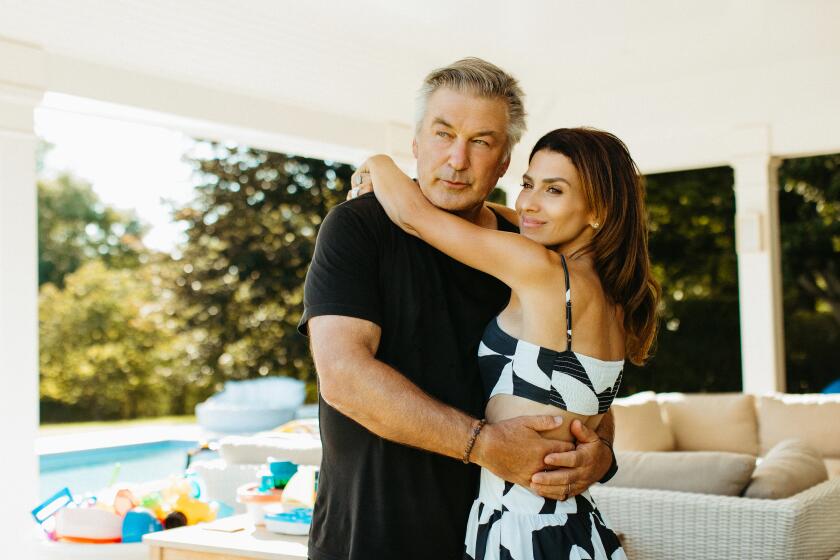Yvette Nicole Brown is letting God lead the way

Yvette Nicole Brown is no stand-up comedian, even if comedic acting is what most people know her for.
- Share via
Yvette Nicole Brown is no stand-up comedian, even if comedic acting is what most people know her for.
“I always have to correct people when they call me a stand-up because I’m not worthy,” she said. “I’m funny off the top of my head and in conversation and with other people's words on a script, but I don't have what it takes to stand in front of a brick wall with a mic.”
Even acting wasn’t what she thought she’d be doing growing up.
“My degree is in communications,” she said. “I thought I would be Oprah. I was planning for that. And I was going to be a singer. I chose music, but acting chose me.
“I feel like in life, it's important to follow the path open to you and that wants you. Otherwise, you’re fighting your way through the roughest terrain.”
What was your first audition like?
It was for a David E. Talbert play, “His Woman, His Wife.” I didn’t really know I was auditioning for him because I was in the drama ministry at my church and David came to watch our rehearsals. We found out later he was scouting talent. So my first time performing to get a job, I didn’t know I was performing to get a job. From that he invited some of us to read and I got the job. That was my first time getting money for performing.
How did you decide to pursue acting full time?
I felt like God had orchestrated everything through that opening and so if he wants me to go through this door, I’m going to go. That’s how I've made every decision I've made in entertainment, because I'm not ambitious. I don't have a five-year or 10-year plan except to keep the lights on at my house. Other than that, I bob and weave to whatever path he sets before me.
When auditioning for roles, what are you looking for?
I care for my dad who has
Like Bea Arthur on 'The Golden Girls,' there's no one sassier than her but she was never defined as a sassy white woman or a sassy tall woman.
— Yvette Nicole Brown

What types of roles have most often come your way?
I have been more nurses, meter maids and assistants — and all of these with sass. If you're in a uniform, they definitely want some neck rolls and eye popping. Now, that is not my natural way of speaking — and every black woman can do that; we have it in us, in our toolbox. But I think they do us a disservice — they being the powers that be on any studio lot — when they think that's all we are. When they present that image as the only version of female blackness we’re allowed to be, it's limiting because we don’t get to paint with all the colors we have.
But you've got to pay your bills, so you may have to crack a neck and roll an eye every now and again … but it's not a black thing, it’s a sassy woman thing. Like Bea Arthur on “The Golden Girls,” there's no one sassier than her but she was never defined as a sassy white woman or a sassy tall woman. She was just a funny woman, so why do we have to be pigeonholed?
It would be nice to have conversation without an implied “jive turkey” in there.
How does your current project fit into that?
I’m blessed right now because I’m working on “The Mayor” and our showrunner Jeremy Bronson is a unicorn in this industry. When I met with him for the role he said something that no white man in this industry has ever said to me. He said, “I know what I don’t know, and I’ve never been a black woman, so if there is ever a moment where I have a question about what a black woman might do in a script, I’m coming to you because you are and have been a black woman.”
That was amazing to me. And I think shows like “Atlanta” and “Insecure” show that when you populate your writer's room with people who look like the people on-screen, you get a grittier, more beautiful vision of what blackness is and what black people are.
What advice do you have for black women coming behind you?
There's more than enough to go around. I say that because we live in the scarcity mind-set when it comes to blackness in this industry.
Second, figure out who you are and where your boundaries are before you go to your first audition because someone will dangle a carrot in front of your face and if you don’t know who you are, you’re going to be somewhere you don’t go, doing something you don’t do, wearing something you don’t wear.
And live below your means. If you are a series regular, live like you’re a guest star. If you're a guest star, live like you’re a costar. If you're a costar, live like you’re a stand-in or an extra for the day. You have to make sure you’re never in a position where you have to take the job because bills are due.
You’re only blessed ever to be a blessing to another. If you’re living in a season of blessings and you ain't got enough to give to somebody you don’t know, you’re doing it wrong.
Get your life! Follow me on Twitter (@TrevellAnderson) or email me: [email protected].
The biggest entertainment stories
Get our big stories about Hollywood, film, television, music, arts, culture and more right in your inbox as soon as they publish.
You may occasionally receive promotional content from the Los Angeles Times.








